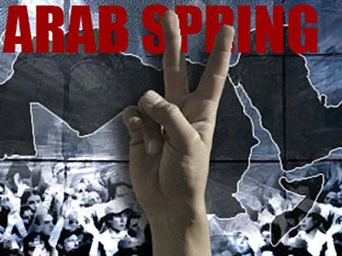 By Gilad Atzmon
By Gilad Atzmon
It is not a secret that summer skipped Europe this year and some meteorologists even predict a sun eclipse for the next seven to ten years. When asked to explain this dire prediction a few experts ended up blaming the Arabs, ‘it is all because of the Arabs, they took all the spring.’
Joking aside, looking at the Arabs and their “Spring” reveals a chilling sight. It is basically an ongoing bloodbath.
A vast popular uprising in the name of “liberation,” “human rights,” “democracy” and other big words has matured in a very short time into regional chaos, civil wars, carnage, loss of life on a huge magnitude scale and scores of interventionist apparatuses that guarantee more havoc to come.
What happened? Why did the “Arab Spring” turn into a regional winter? Why didn’t the Egyptian democracy last more than a year?
I am not going to answer any of these questions. Instead, I will offer a simple method to address these issues.
Some 18 months ago I published The Wandering Who, A Study of Jewish Identity Politics. I argued that if we want to grasp Israel or the extent of Jewish Power we must dig into the ideologies and culture that formed the “Jewish State” and sustain Jewish tribalism and politics.
The book caused a storm, it was praised by some of the most important academics and humanists but it was also harshly opposed by many Jewish tribal activists and a few of their dedicated Sabbath Goyim.
It was, however, the opposition to my work that actually convinced me that I was on the right track — a theoretical and critical study of culture and identity politics is clearly the way forward. The study of Jewish culture explains Israeli barbarism, as it does the Israeli negligence of human rights, it throws light on the Neocon interventionist agenda and it also elucidates the spin at the heart of Jewish Left and Anti-Zionist Zionists (AZZ). It clearly explains why Palestinians are still living in refugee camps while American and British soldiers are fighting Zionist wars.
I would argue here that scholars and Arab intellectuals in particular should similarly examine closely the Arab culture and identity politics in order to understand and amend the grave current situation.
Such an examination could reveal, for instance, that “Western democracy” may not be the optimal political system for various states in the Middle East. Such a study will have to take into account Islam’s take of the notion of the “civil,” it would have to consider the demographics of different Arab regions and states. It may even have to question the notion of “State” in reference to Arab culture and history. Class division in the Arab society is also a crucial topic that must be examined. Such a study could benefit from a theoretical examination of the unique manner in which the Islamic Republic of Iran balances Islam and democracy. Such a study would transcend beyond politics, global affairs and the decaying material dialectic manner of thought. It would locate the subject matter i.e., the Arab and the Arab World, at the centre of the discourse.
Such scholarship should raise the following questions: Who are the Arabs, the Egyptians, the Syrians, the Palestinians and so on? What do they believe in? What unites them? What separates them? What can they agree upon? What terrifies them? What makes them happy?
Once Arabs start to deal with these questions they may realise that rather than killing each other for Israel, America or Russia they should identify who they are for real and who their real enemies are.
The Wandering Who? A Study Of Jewish Identity Politics Amazon.com or Amazon.co.uk

Gilad Atzmon is an Israeli-born British jazz saxophonist, novelist, political activist and writer.
Atzmon’s album Exile was BBC jazz album of the year in 2003. Playing over 100 dates a year,[4] he has been called “surely the hardest-gigging man in British jazz.” His albums, of which he has recorded nine to date, often explore the music of the Middle East and political themes. He has described himself as a “devoted political artist.” He supports the Palestinian right of return and the one-state solution in the Israeli-Palestinian conflict.
His criticisms of Zionism, Jewish identity, and Judaism, as well as his controversial views on The Holocaust and Jewish history have led to allegations of antisemitism from both Zionists and anti-Zionists. A profile in The Guardian in 2009 which described Atzmon as “one of London’s finest saxophonists” stated: “It is Atzmon’s blunt anti-Zionism rather than his music that has given him an international profile, particularly in the Arab world, where his essays are widely read.”
His new book The Wandering Who? is now availble at Amazon.com
ATTENTION READERS
We See The World From All Sides and Want YOU To Be Fully InformedIn fact, intentional disinformation is a disgraceful scourge in media today. So to assuage any possible errant incorrect information posted herein, we strongly encourage you to seek corroboration from other non-VT sources before forming an educated opinion.
About VT - Policies & Disclosures - Comment Policy



